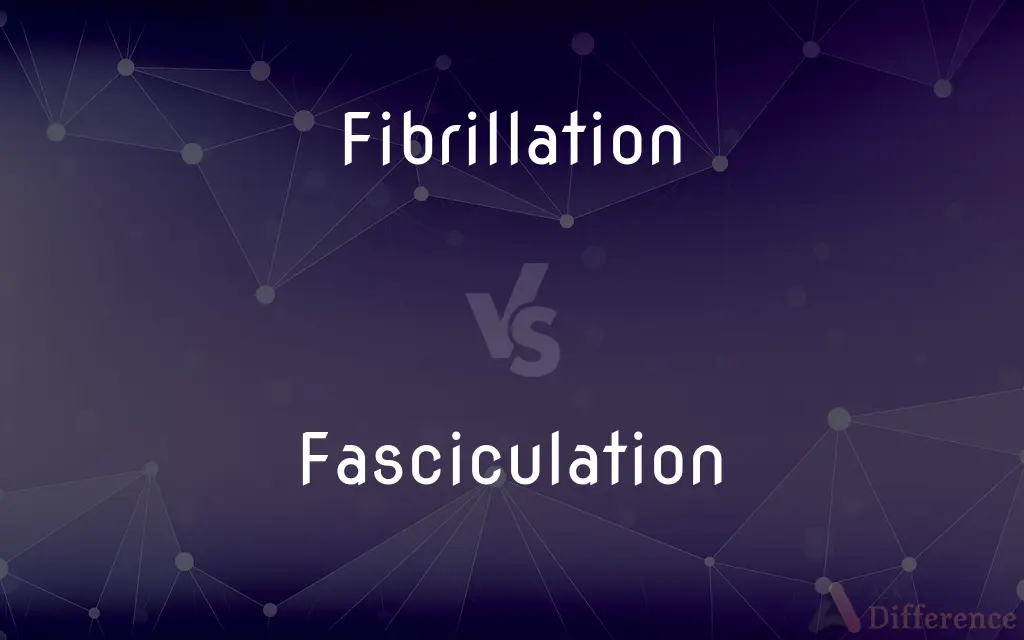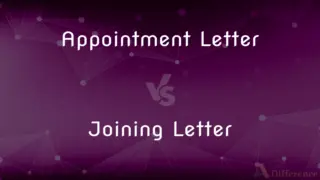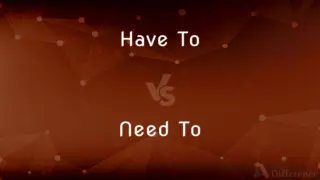Fibrillation vs. Fasciculation — What's the Difference?
By Tayyaba Rehman — Published on November 25, 2023
Fibrillation means abnormal, rapid heart rhythms due to erratic contractions, while Fasciculation is involuntary muscle twitches under the skin, not causing joint movement.

Difference Between Fibrillation and Fasciculation
Table of Contents
ADVERTISEMENT
Key Differences
Fibrillation and Fasciculation, though both medical terms related to muscles, denote distinct phenomena. Fibrillation is primarily associated with the heart and refers to an abnormal and often rapid heartbeat. When the heart's atria or ventricles contract erratically, it leads to different types of fibrillation, like atrial or ventricular. Such erratic contractions can compromise the heart's ability to pump blood efficiently throughout the body, leading to serious health complications.
Conversely, Fasciculation pertains to the skeletal muscles and doesn't involve the heart. It's characterized by small, involuntary muscle twitches. These twitches, which can often be seen under the skin, don't generate significant movement of the affected body part. Fasciculations are generally harmless and can be caused by various factors, including fatigue, stress, or even caffeine consumption.
In observing the body, Fibrillation, especially of the heart, might not be visibly noticeable but can manifest symptoms like dizziness, breathlessness, or chest pain. On the other hand, Fasciculation often presents as visible muscle twitches, although they're usually painless and don't produce a gross movement of the limb.
One crucial distinction between Fibrillation and Fasciculation lies in their seriousness. While fasciculations are often benign and don't signify any underlying pathology, fibrillation, especially ventricular fibrillation, can be life-threatening and demands immediate medical attention. Both terms underscore the importance of understanding our body's signals and seeking appropriate medical advice when in doubt.
Comparison Chart
Associated Organ
Heart
Skeletal muscles
ADVERTISEMENT
Manifestation
Abnormal heart rhythms
Visible muscle twitches
Symptoms
Breathlessness, dizziness, chest pain
Typically asymptomatic
Causes Movement
No
No
Severity
Can be life-threatening
Often benign
Compare with Definitions
Fibrillation
Requires medical intervention, sometimes urgent.
Immediate treatment was initiated to manage the patient's fibrillation.
Fasciculation
Quick, spontaneous contractions of muscle fibers.
After an intense workout, she noticed fasciculation in her calf muscles.
Fibrillation
Abnormal heart rhythms due to erratic contractions.
The patient was diagnosed with atrial fibrillation after experiencing palpitations.
Fasciculation
Might sometimes indicate underlying neurological conditions.
Persistent fasciculation led him to consult a neurologist to rule out serious conditions.
Fibrillation
Compromises the heart's pumping efficiency.
Fibrillation can lead to reduced blood flow, causing dizziness and fatigue.
Fasciculation
Typically benign and can be caused by various factors.
Overconsumption of caffeine triggered fasciculation in her eyelid.
Fibrillation
Can be atrial or ventricular based on heart chambers affected.
Ventricular fibrillation is a medical emergency requiring prompt intervention.
Fasciculation
Often visible under the skin but doesn't move the joint.
Despite the visible fasciculation, there was no significant movement in his arm.
Fibrillation
Often detected using electrocardiograms (ECGs).
The ECG confirmed the doctor's suspicion of fibrillation in the patient.
Fasciculation
Involuntary twitches not initiated by the person.
The fasciculation on his face was noticeable but didn't cause any pain.
Fibrillation
The forming of fibers.
Fasciculation
A form of involuntary muscular contraction that is more intense than fibrillation, consisting of simultaneous twitching of adjacent groups of muscle fibers.
Fibrillation
Fine, rapid twitching of individual muscle fibers with little or no movement of the muscle as a whole.
Fasciculation
An arrangement of fasciculi.
Fibrillation
Rapid uncoordinated twitching movements that replace the normal rhythmic contraction of the heart and may cause a lack of circulation and pulse.
Fasciculation
An involuntary muscle twitch, usually localised and temporary, but that may be intensified and prolonged fatally by particular poisons and venoms such as acetylcholinesterase inhibitors.
Fibrillation
The rapid, irregular, and unsynchronized contraction of the muscle fibers of the heart.
Fasciculation
A cluster of fascicules.
Fibrillation
The state of being reduced to fibers.
Fasciculation
Muscular twitching of contiguous groups of muscle fibers
Fibrillation
Muscular twitching involving individual muscle fibers acting without coordination
Fibrillation
Act or process of forming fibrils
Common Curiosities
Are the twitches from Fasciculation painful?
Typically, fasciculations are painless, though they can be annoying or concerning to some people.
How can Fibrillation impact the body's overall function?
Fibrillation can compromise the heart's ability to pump blood, potentially affecting oxygen and nutrient supply to various organs.
What's the difference between atrial and ventricular Fibrillation?
Atrial fibrillation occurs in the heart's upper chambers, while ventricular fibrillation affects the lower chambers.
Is Fasciculation a sign of a serious neurological disorder?
While fasciculations can be benign, persistent or widespread twitches may indicate a neurological condition and warrant a medical consultation.
What is the primary definition of Fibrillation?
Fibrillation refers to the rapid, irregular, and often chaotic contractions of heart muscles.
How does Fasciculation manifest in the body?
Fasciculation presents as involuntary, often visible muscle twitches under the skin.
Is Fibrillation always a cause for concern?
While atrial fibrillation can be managed with treatment, ventricular fibrillation is life-threatening and requires immediate medical attention.
What's the primary cause of Fibrillation?
Multiple factors, including heart disease, high blood pressure, and certain medications, can increase the risk of fibrillation.
Can caffeine or stress trigger Fasciculation?
Yes, both caffeine intake and stress are common causes of benign fasciculations.
How is Fibrillation detected in a patient?
Fibrillation is usually diagnosed using electrocardiograms (ECGs) which measure the heart's electrical activity.
Can exercise or fatigue induce Fasciculation?
Yes, muscle fatigue or overexertion can sometimes result in temporary fasciculations.
Is Fibrillation a permanent condition?
Not necessarily. Some individuals may experience transient episodes, while others might have chronic fibrillation requiring ongoing treatment.
Can Fasciculation occur anywhere in the body?
Fasciculation primarily affects skeletal muscles, so it can occur in various body parts, from eyelids to legs.
Are there any visible signs of Fibrillation similar to Fasciculation's muscle twitches?
No, Fibrillation's erratic heart rhythms are internal and usually not visibly noticeable, unlike Fasciculation's muscle twitches.
Are there treatments available for both Fibrillation and Fasciculation?
Yes, fibrillation treatments aim to restore normal heart rhythms, while fasciculation treatments, if needed, focus on addressing underlying causes or providing symptom relief.
Share Your Discovery

Previous Comparison
Appointment Letter vs. Joining Letter
Next Comparison
Have To vs. Need ToAuthor Spotlight
Written by
Tayyaba RehmanTayyaba Rehman is a distinguished writer, currently serving as a primary contributor to askdifference.com. As a researcher in semantics and etymology, Tayyaba's passion for the complexity of languages and their distinctions has found a perfect home on the platform. Tayyaba delves into the intricacies of language, distinguishing between commonly confused words and phrases, thereby providing clarity for readers worldwide.
















































